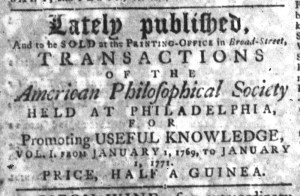What was advertised in a colonial American newspaper 250 years ago this week?

“TRANSACTIONS OF THE American Philosophical Society.”
Nicholas Langford advertised a “COLLECTION OF BOOKS” and magazines “Just imported … from LONDON” in the March 26, 1772, edition of the South-Carolina Gazette. He invited prospective customers to peruse a “printed CATALOGUE of the whole COLLECTION” while he prepared this new shipment for sale. Elsewhere in the same issue, readers encountered an advertisement for other reading material, the “TRANSACTIONS OF THE American Philosophical Society HELD AT PHILADELPHIA FOR Promoting USEFUL KNOWLEDGE.” Peter Timothy, the printer of the South-Carolina Gazette, sold the “TRANSACTIONS” at his printing office on Broad Street in Charleston.
The American Philosophical Society had recently formed in 1769 as a result of a merger between the Philosophical Society, an organization founded by Benjamin Franklin and others in 1743, and the American Society for Promoting Useful Knowledge. Franklin served as the first president. The American Philosophical Society did not limit membership to residents of Philadelphia but instead adopted practices similar to those of other learned societies by recruiting members from various European nation-states as well as colonies in North America, the Caribbean, and beyond. Members participated in a transatlantic “republic of letters” and scientific inquiry through their correspondence, collecting, and reading.
Some of the most elite and genteel colonizers in South Carolina also participated in that community. They cultivated and maintained relationships with correspondents throughout the Atlantic World, acquired and transported specimens on behalf of friends and acquaintances in distant places, and read the same books, magazines, and transactions of learned societies as their illustrious counterparts in other places. In advertising and selling the “TRANSACTIONS OF THE American Philosophical Society,” local printers and booksellers like Timothy helped colonizers access and contribute to conversations about political philosophy, natural philosophy, and many other sorts of “USEFUL KNOWLEDGE.” Although the American Philosophical Society declared that it was “HELD AT PHILADELPHIA,” the publication, marketing, and sale of the first volume of its “TRANSACTIONS,” covering January 1 1769, through January 1, 1771, signaled that producing and consuming knowledge could not be confined to a single location. Printers and booksellers who advertised that volume encouraged prospective customers to actively engage with the American Philosophical Society and a larger transatlantic community of scholars.
